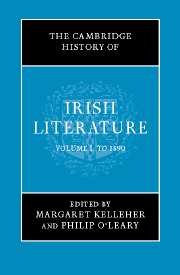Book contents
- Frontmatter
- Introduction
- 1 The literature of medieval Ireland to c. 800: St Patrick to the Vikings
- 2 The literature of medieval Ireland, 800–1200: from the Vikings to the Normans
- 3 The literature of later medieval Ireland, 1200–1600: from the Normans to the Tudors
- 4 Literature in English, 1550–1690: from the Elizabethan settlement to the Battle of the Boyne
- 5 Literature in Irish, c.1550–1690: from the Elizabethan settlement to the Battle of the Boyne
- 6 Prose in English, 1690–1800: from the Williamite wars to the Act of Union
- 7 Poetry in English, 1690–1800: from the Williamite wars to the Act of Union
- 8 Literature in Irish, 1690–1800: from the Williamite wars to the Act of Union
- 9 Theatre in Ireland, 1690–1800: from the Williamite wars to the Act of Union
- 10 Irish Romanticism, 1800–1830
- 11 Prose writing and drama in English, 1830–1890: from Catholic emancipation to the fall of Parnell
- 12 Poetry in English, 1830–1890: from Catholic emancipation to the fall of Parnell
- 13 Literature in Irish, 1800–1890: from the Act of Union to the Gaelic League
- 14 Historical writings, 1690–1890
- 15 Literature and the oral tradition
- Guide to major subject areas
- Index
- References
5 - Literature in Irish, c.1550–1690: from the Elizabethan settlement to the Battle of the Boyne
Published online by Cambridge University Press: 28 March 2008
- Frontmatter
- Introduction
- 1 The literature of medieval Ireland to c. 800: St Patrick to the Vikings
- 2 The literature of medieval Ireland, 800–1200: from the Vikings to the Normans
- 3 The literature of later medieval Ireland, 1200–1600: from the Normans to the Tudors
- 4 Literature in English, 1550–1690: from the Elizabethan settlement to the Battle of the Boyne
- 5 Literature in Irish, c.1550–1690: from the Elizabethan settlement to the Battle of the Boyne
- 6 Prose in English, 1690–1800: from the Williamite wars to the Act of Union
- 7 Poetry in English, 1690–1800: from the Williamite wars to the Act of Union
- 8 Literature in Irish, 1690–1800: from the Williamite wars to the Act of Union
- 9 Theatre in Ireland, 1690–1800: from the Williamite wars to the Act of Union
- 10 Irish Romanticism, 1800–1830
- 11 Prose writing and drama in English, 1830–1890: from Catholic emancipation to the fall of Parnell
- 12 Poetry in English, 1830–1890: from Catholic emancipation to the fall of Parnell
- 13 Literature in Irish, 1800–1890: from the Act of Union to the Gaelic League
- 14 Historical writings, 1690–1890
- 15 Literature and the oral tradition
- Guide to major subject areas
- Index
- References
Summary
Introduction
As crown officials began to exercise more and more control over Ireland in the second half of the sixteenth century, the Tudor state considered the spread of Protestantism to be an essential element of its political and civilising role. Given the Protestant Reformation’s insistence on the vernacular for scripture and public worship, and its alacrity in exploiting the recently discovered resources of print technology to disseminate bibles and other religious material in the vernacular, it is not surprising that it was the Reformation that introduced printing to the Gaelic world. The first Irish book in print, however, did not appear until 1567, printed in Edinburgh and not in Dublin, and it was not until 1602 that an Irish translation of the New Testament was printed in Dublin.
The first section of this chapter examines the attempts of the state authorities to publish Protestant religious works in Irish and provides a context for their less than enthusiastic efforts. Catholic reaction to Protestant religious propaganda was not really organised on a systematic basis until the second decade of the seventeenth century. Spearheaded in particular by the Observant Franciscans who were fortunate to have a number of exceptionally talented members of the Gaelic literati join the order at this time, the campaign to counteract Protestant religious work in Irish was centred on the Irish Franciscan College which was founded in Louvain in 1607. The second section of this chapter deals with the religious works written and printed in Louvain, works which also led to the production of grammars and dictionaries as the use of print led the friars to engage in serious reflection on vernacular languages in general and on Irish in particular.
- Type
- Chapter
- Information
- The Cambridge History of Irish Literature , pp. 191 - 231Publisher: Cambridge University PressPrint publication year: 2006
References
- 7
- Cited by

